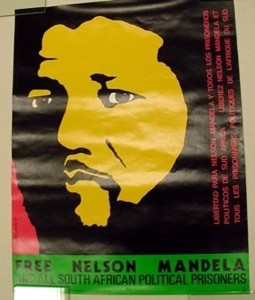- A Luta Continúa: About the Exhibition
- Festival of African Arts and Culture (FESTAC)
- ANC Radio Freedom
- Day of Angolan Women
- Free Nelson Mandela
- Jorge Rebelo
- Nelson Mandela: The Struggle Is My Life
- Our History Did Not Begin in Chains
- Sobukwe
- South African Women’s Day
- SWAPO: The People Armed
- Victory to the People of Southern Africa
- Video Tour with Don Rothman, September 2002
Worldwide demands for the release of Nelson R. Mandela from imprisonment began to shape following the infamous Rivonia Treason Trial of 1963. As time went on and an international anti-apartheid movement grew, demands for Mandelas release, and all the scores of freedom fighters imprisoned by the South African apartheid regime became hallmarks of the global anti-apartheid movement from the nineteen sixties through his actual release in 1990. Initially Mandela, along with both rank and file and leadership cadres from the ANC, PAC, NEUM (Non-European Unity Movement) SACP (South African Communist Party) and other anti-apartheid activists, affiliated and unaffiliated were held in Robben Island now a museum. Mandela and other key leaders were transferred to Pollsmoor Prison in 1982. On 31 January 1985 the State President of South Africa, P W Botha, speaking in parliament, offered Mandela his freedom on condition that he unconditionally rejected violence as a political weapon. This was the sixth such offer, earlier ones stipulating that he accept exile in the Transkei. His daughter Zinzi read Mandelas reply to this offer to a mass meeting in Jabulani Stadium, Soweto, on 10 February, 1985. This was the text of his response as read publicly by Zinzi:
I am a member of the African National Congress. I have always been a member of the African National Congress and I will remain a member of the African National Congress until the day I die. Oliver Tambo is much more than a brother to me. He is my greatest friend and comrade for nearly fifty years. If there is any one amongst you who cherishes my freedom, Oliver Tambo cherishes it more, and I know that he would give his life to see me free. There is no difference between his views and mine.
I am surprised at the conditions that the government wants to impose on me. I am not a violent man. My colleagues and I wrote in 1952 to Malan asking for a round table conference to find a solution to the problems of our country, but that was ignored. When Strijdom was in power, we made the same offer. Again it was ignored. When Verwoerd was in power we asked for a national convention for all the people in South Africa to decide on their future. This, too, was in vain.
It was only then, when all other forms of resistance were no longer open to us, that we turned to armed struggle. Let Botha show that he is different to Malan, Strijdom and Verwoerd. Let him renounce violence. Let him say that he will dismantle apartheid. Let him unban the peoples organisation, the African National Congress. Let him free all who have been imprisoned, banished or exiled for their opposition to apartheid. Let him guarantee free political activity so that people may decide who will govern them.
I cherish my own freedom dearly, but I care even more for your freedom. Too many have died since I went to prison. Too many have suffered for the love of freedom. I owe it to their widows, to their orphans, to their mothers and to their fathers who have grieved and wept for them. Not only I have suffered during these long, lonely, wasted years. I am not less life-loving than you are. But I cannot sell my birthright, nor am I prepared to sell the birthright of the people to be free. I am in prison as the representative of the people and of your organisation, the African National Congress, which was banned.
What freedom am I being offered while the organisation of the people remains banned? What freedom am I being offered when I may be arrested on a pass offence? What freedom am I being offered to live my life as a family with my dear wife who remains in banishment in Brandfort? What freedom am I being offered when I must ask for permission to live in an urban area? What freedom am I being offered when I need a stamp in my pass to seek work? What freedom am I being offered when my very South African citizenship is not respected?
Only free men can negotiate. Prisoners cannot enter into contracts. Herman Toivo ja Toivo, when freed, never gave any undertaking, nor was he called upon to do so. I cannot and will not give any undertaking at a time when I and you, the people, are not free.Your freedom and mine cannot be separated. I will return.
It was his final destination as a prisoner before his release by F. W. de Klerk. By 1990, de Klerk was careful to make certain that Mandelas freedom would be unconditional.
